Alchemy Works Incense & Resins
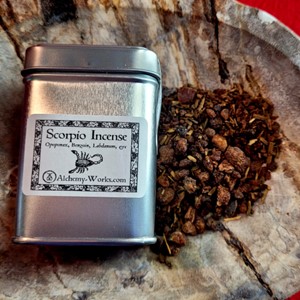
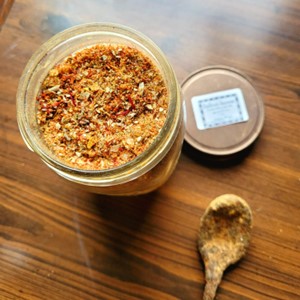
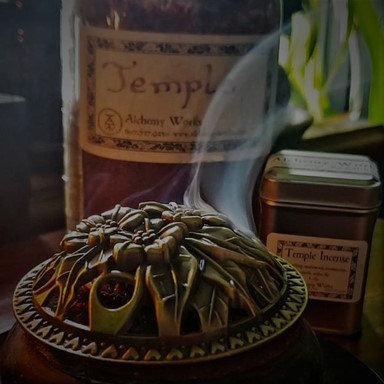
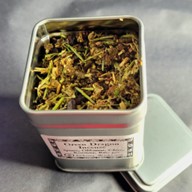
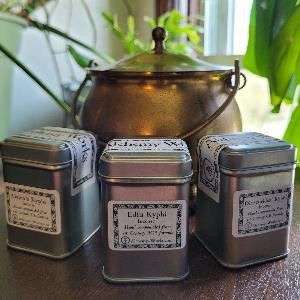
These resins and many of the incense blends have historically played a role
in ancient and modern Paganism, Traditional Witchcraft, Wicca, and various forms of ceremonial magic/k.
Because they come from plants, they have a depth of scent and a connection to life and the Earth that
fragrances made from petrochemicals can never have. All Alchemy Works incense is handcrafted according to the apothecary's art using a consecrated mortar and pestle.
We work only with all natural materials that we have grown and/or personally gathered, or that we source from suppliers that are committed to providing sustainably-grown, high quality, natural and/or organic botanical ingredients. Our loose incense blends are based on personal recipes or on historically accurate formulae that have been gathered
through researching works like the Ebers papyrus or Dioscorides' Materia Medica.
Loose incense is the oldest and most traditional form of incense. It takes a bit more effort to burn, but that effort is richly rewarded and a little loose incense goes a long way. We measure our incense by weight, not by volume, and package each ounce in a square, resealable tin. We ship our viscous resins in glass vials, and our dry resins in waxed paper bags. These bags are more sustainable than plastic packaging and the labels peel off easily, allowing you to transfer them to a glass jar or whatever longterm storage solution you prefer.
For over 20 years Alchemy Works has sought to provide premium ingredients while also keeping our prices accessible.
As active spiritual practitioners ourselves, we understand the importance of using quality, ethically-sourced materials. Good ingredients potentiate magical works. If an ingredient doesn't satisfy our personal standard for ritual practice, we will not sell it.
|
Abramelin Incense - French & German
Benzoin Resin - Thai & Sumatran Dragon's Blood Resin - Sumatran & Socotran Elemental Incenses - Salamander, Sylph, Undine & Gnome |
Flowers of Venus
Fruits of Jupiter
Golden Dawn Style Angelic Incenses - Raphael, Gabriel, Michael, & Uriel Holiday Incenses - Midsummer, Nemoralia, etc. |
Nemoralia Incense
Paths in the Dark Incense (Saturn) Resins of the Sun Roots of SaturnSalamander Elemental Fire Incense Seeds of MercuryTagriel Incense - Love & Affection Tetragrammaton Incense - Crowley's Recipe Trickster/Teacher Incense (Mercury) Undine Elemental Water Incense Vernal (Spring) Equinox Incense Woods of Mars |
There are many more
botanicals, including other fragrant woods like red and white sandalwood and cedar, that make excellent
natural incense in the
herbs section.
Mixing up your own
incense? We use large stone mortars and pestles* to grind all of our incense ingredients. Our primary mortar is eight inches in diameter and is made of unpolished granite with a somewhat rough texture. (You can find a similar one in almost any kitchen supply shop.) We typically grind herbs and resins together--the hardness of the resins helps cut through tougher herbs like lemongrass or myrtle. It is best to work with only a small amount at a time. Using our eight-inch mortar, we generally work with no more than two ounces at once, and often much less, depending on the ratio of resins to herbs, the volume of the herbs, and the specific properties of what is being ground. Roots and woods, for example, require more grinding so it is easier to work with just a bit at a time. After the ingredients are ground to a satisfactory texture, we mix them all together in a large bowl, then we add any powdered or wet ingredients such as wine, viscous resins, reduced honey, or essential oils, stirring everything together until all is evenly distributed. Once everything is dry, we store the incense in an airtight container, such as a mason jar or tea tin. © 2004-2024 Alchemy Works; No reproduction without permission
Alchemy Works products are offered for use in spiritual, ritual, meditative, and magical practices, not for medicinal or cosmetic purposes. The information on this website is provided for its folkloric, historic, and magical value. It is not intended to be a substitute for professional medical advice, diagnosis, or treatment.
Some other incense-making tips:
If you do not have the ability to grind incense by hand, a heavy-duty coffee grinder* can also be used. However, if you use a coffee grinder to break up resins up into smaller pieces or powder, it will become gummed up and fail eventually; it will also have trouble grinding roots or woods. Sugar added to incense makes for extra smoke and sweetens the scent; honey works well for this and as a binder. Bits of dried fruit soaked in wine are nice for binding powdered resins--they contain sugar as well as a scent of their own and are especially good for Venus blends. Wine also tends to be Venus-aligned, although some might consider it more Solar or Dionysian. When working with thick resins like labdanum or storax, heating them slightly will make them more runny. You should always let your incense dry completely before storing it, otherwise it may develop mold, (especially if you have used wine or other water-based ingredients). However, an incense that is dry may still feel sticky depending on what resins have been used.
* This should be obvious, but whatever mortar and pestle or coffee grinder you use to make incense should be reserved for this purpose only; do not use it for your coffee or anything else you plan to ingest.